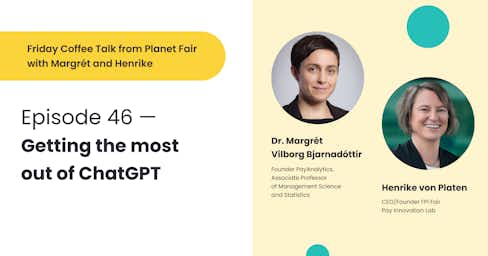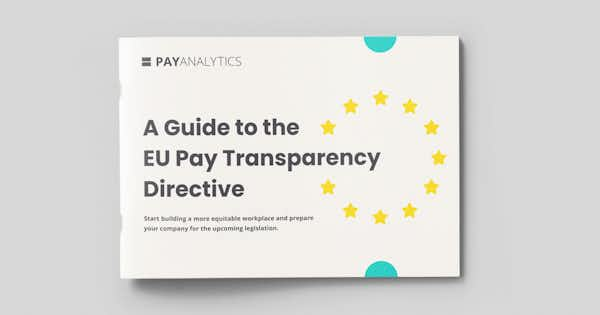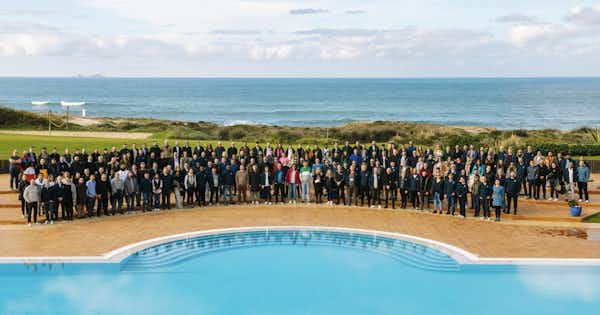Vorbereitung auf die EU-Lohntransparenzrichtlinie | Laden Sie unser E-Book kostenlos herunter

#46 - Getting the most out of ChatGPT for HR
In this week’s coffee talk, Margrét and Henrike chat ChatGPT and its applications for HR. They coach us in best practices for posing questions to the chatbot to yield the most valuable answers for HR practitioners, and point out where (and why) to use caution. And did we mention there’s a side-by-side demo of ChatGPT3.5 and 4?
Over the past 10 years, Margrét Bjarnadóttir has closely followed developments in deep learning. And, until this past November, she wasn’t on the deep learning bandwagon.
“There’ve been remarkable leaps forward, especially in image recognition. And a lot of my work in this area is in HR or healthcare, where our focus has always been on transparent machine learning,” she began. Transparency in applications that critically influence well-being is paramount; you can’t make a decision based on information that you can't trust, that you don't know to be dependable and valid.
“Nobody is going to make an HR or a clinical decision without understanding what’s behind it," she concluded.
Last November, however, she began to investigate the strengths and applications of tools like ChatGPT—and she found herself swayed. "Chat GPT will make us more 'predictive'," she said, thereby accelerating the day-to-day work of, for example, writing and translating e-mails, formulating meeting notes, and even summarizing and translating vast amounts of information.
"It [misses] a few nuances, but the broad strokes" are generally solid.
Best practices for writing ChatGPT prompts
Writing prompts and questions for ChatGPT is its own skill. Though the intelligent chatbot may seem to be an endless fount of knowledge, you have to use the right words to get a strong answer. It may sound a bit obvious, but the practice of crafting a question or prompt for the interface is, indeed, nuanced.
To yield the most relevant response, the prompts we feed into the system should include attributes like a backdrop, a clear indication of the audience, and information on tone of voice. ChatGPT performs well with shorter prompts, and thrives on specificity, so it’s critical to clearly define context and provide as much relevant information as possible. Identifying your target audience and specifying their point of view will yield a better outcome, too. Clarity follows clarity.
Instead of asking open-ended or vague questions, Margrét tells us, try to ask specific and focused ones.
Which of these two questions is stronger?
- Why is pay transparency so important?
- What are the most important requirements of an effective and transparent fixed compensation set-up for the employees of a multinational company, from the perspective of a global headquarter design, implementation, and administration? Answer should fit into one A4-sized page.
While the intent behind these two prompts may be different (for example, question one seems to be informational, but the second shows intention to act), one of them is more likely to get a more optimal response. (To find out which query got the “better” answer, watch the coffee talk!)
How to write a job requisition using ChatGPT
Knowing how to ask the right question or formulate the right prompt is a time-saving game-changer for most organizations. For example, if you need to draft a job description of a software engineer at a cloud computing company, you might start by asking “what are the responsibilities of a software engineer?” but to yield a usable requisition that potential applicants will respond to, you’ll need to get more specific. Which questions might you ask in your prompt to the chatbot to get a fleshed out job description?
“The more specific you are on what you want from the ChatGPT chatbot, the better the answer will be,” Margrét added. “We all have to get familiar with how to utilize these tools because they’re going to become a part of how we do our work.”
Watch this week’s coffee talk for a hands-on deep (but brief!) dive into the nebulous world of ChatGPT.
To learn more about the applications of AI for HR, check out the blog.
Friday Coffee Talk from Planet Fair is a podcast/videocast series co-hosted by PayAnalytics founder Margrét Bjarnadóttir and Henrike Von Platen, founder and CEO of the FPI Fair Pay Innovation Lab in Berlin. It is available through all podcast platforms as well as on YouTube as a videocast.


